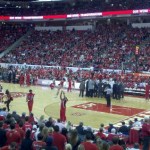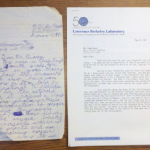Science
It's a harsh world for us men. Oh, sure, we've got all the political and economic power, and we've got most of the guns, but step into a senior citizens' center and you'll notice the preponderance of elderly women. Men die younger, on average. I'm also acutely aware of the growing disparity as we get older: my wife seems to be aging at about half the rate I do. If you've been watching House of Cards on Netflix, you may have noticed that the character played by Kevin Spacey, face a bit puffy and deeply lined, is married to a character played by Robin Wright (Princess Buttercup!) who is looking…
Ok - I'm crowdsourcing the internet, because the google has failed:
there are two science fiction short stories that I need titles and authors for, source in anthology or collection would be better still.
1) humans in slower-than-light spaceship set out to colonize planet identified around nearby star. When they finally get there, they find the planet already colonized by humans, who had left after them but on a faster (ftl?) spaceship and arrived before them
2) humans expand around galaxy and find no intelligent life - finally contact is made, arrangements are set up to treat with aliens,…
I have a bit of a peeve with a common analogy for the human genome: that it is the blueprint of the body, and that we can find a mapping of genes to details of our morphological organization. It's annoying because even respectable institutions, like the National Human Genome Research Institute, use it as a shortcut in public relations material. And it is so wrong.
There is no blueprint, no map. That's not how the system works. What you actually find in the genome are coding genes that produce proteins, coupled to regulatory elements that switch the coding genes off and on using a kind of…
This is the second post in which I'm pulling a revise-and-extend job on some things I said at Science Online at a few panels on bloggy stuff: in the how-to-do-outreach session (posted yesterday, the blogging long term session, and the what-to-do-when-people-start-taking-you-seriously session. In order to get these out in a timely manner, while catching up on all the work I have to do, I'm splitting these up into individual posts, though really they all kind of fit together.
Blogging for the Long Haul
There were two easily misinterpretable things that I said at this one, that deserve a bit of…
I ended up feeling that my most valuable contribution to the Science Online meeting (other than boosting the income of the Marriott's bartenders) was providing experienced commentary and advice from a slightly different angle than a lot of the other participants. A bunch of this got tweeted out by other people in the sessions, but the format (both at the conference and on Twitter) necessarily strips a lot of nuance out of what I was trying to say (and not always saying successfully). so I thought I'd revise and expand on my remarks a little bit. In particular, I want to post expanded versions…
The Sciece Online meeting wrapped up yesterday afternoon, though the associated conversations and socialization carried on late into the night. I got to meet a lot of people I've only previously known as cartoon avatars, and spent a surprising amount of time talking about rugby.
One of the things that stands out about the meeting, and that lots of people raved about, is the "unconference" style, where there aren't formal presentations, but moderated discussions. This wasn't all that surprising to me, because it's essentially identical to the more casual sort of panel at a science fiction…
Oh gob, the stupidity. The latest wave of anti-choice legislation is based on one trivial premise: it's got a heartbeat! You can't kill it if its heart is beating! So stupid bills have been flitting about in the Ohio, Mississippi, Wyoming, Arkansas, and North Dakota legislatures trying to redefine human life as beginning at the instant that a heartbeat can be detected. Here's Wyoming's story, for instance:
About two weeks ago, state Rep. Kendell Kroeker (R) introduced a measure to supersede the medical definition of viability. Current state law says abortions are prohibited after a fetus has…
I thought I had mentioned it on Twitter enough, but as several people were surprised to see me last night, it's probably worth saying more prominently: I'm at the Science Online 2013 conference in Raleigh, NC this week. This is making me tremendously popular with my class, who are taking an exam tonight...
Anyway, if you weren't aware that I was going to be here, now you know. If last night and this morning are any indication, I may not have any voice left by the end of the conference-- the bar was LOUD last night-- but if you're around, say hi.
My students are also blogging here:
My undergrad encounters
Developmental Biology
Miles' Devo Blog
Tavis Grorud’s Blog for Developmental Biology
Thang’s Blog
Heidi’s blog for Developmental Biology
Chelsae blog
Stacy’s Strange World of Developmental Biology
Thoughts of Developmental Biology
Biology~
You really can't teach a class by lecturing at them…especially not an 8am class. But sometimes there is just such a dense amount of information that I have to get across before the students know what to ask that I have to just tell them some answers. My compromise to deal…
My students are also blogging here:
My undergrad encounters
Developmental Biology
Miles' Devo Blog
Tavis Grorud’s Blog for Developmental Biology
Thang’s Blog
Heidi’s blog for Developmental Biology
Chelsae blog
Stacy’s Strange World of Developmental Biology
Thoughts of Developmental Biology
Today was more context and a bit of a caution for my developmental biology course. I warned them that we'd be primarily talking about animals and plants (and mostly animals at that), but that actually, all of the general processes we're describing are found in bacteria and other single…
Our future foretell
Galaxies of stellar poems
From space science spring
Inspired by Jason Wright's Thesis, Lucianne Walkowicz called out Astronomers on facebook to describe their current research as Haiku
To the Occasion
All Astronomers Sprung Forth
Poetic Research
There is a collection of some of the contributions at
Rhymes Like Science
Where my feeble efforts fall
Amongst stellar prose
Dynamics of Cats
Cold winter sky glow
crushed stars dance in my dreams
where will life go now?
Clearly this can be expanded on: we need iambic pentameter, limericks, and poetry of the sagas - proper…
Ken Ham is preaching about what science is again. He's accusing the secular activist Zack Kopplin of being "brainwashed" by evolutionist propaganda, and to support this claim, he once again drags out the tired proposition that there are two kinds of science, historical and observational, and that only the observational kind is valid; well, unless the historical version is based on the Bible, which in his dogma is an unassailable compendium of absolutely true facts about the past.
What’s more, Kopplin—like almost all evolutionists—confuses historical science with operational (observational)…
While in the library looking for something else, I noticed a book called The Trouble with Science by Robin Dunbar, whose description made it sound very much on point for my current project:
In The Trouble with Science, Robin Dunbar asks whether science really is unique to Western culture, even to humankind. He suggests that our "trouble with science"--our inability to grasp how it works, our suspiciousness of its successes--may lie in the fact that evolution has left our minds better able to cope with day-to-day social interaction than with the complexities of the external world.
Somewhat…
I have mentioned before that when I was a kid, I wrote a letter to Luis Alvarez, the 1968 Nobel laureate in Physics, asking some questions about his theory that an asteroid impact killed the dinosaurs, which had been featured in a NOVA special. I got a very nice letter back from him, very graciously correcting the dumber questions I asked. This made a very favorable impression, which in turn played a role in getting me to include him in the work-in-progress.
Since I was thinking about Alvarez for the book, I asked my parents if they still had a copy of the letter, which for many years I had…
As research for the work-in-progress, I recently read Luis Alvarez's autobiography, Alvarez: Adventures of a Physicist, which contains a passage that I was reminded of last night while reading another book, that seems like an amusing follow-up to yesterday's rant about theory and experiment. This is from the end of the chapter where he joined Ernest Lawrence's Radiation Lab at Berkeley, and found he needed to get up to speed on a lot of physics he'd missed learning at the University of Chicago:
The other important component to my self-help program was a detailed study of three articles that…
There's been a bunch of talk recently about a poll on quantum interpretations that showed physicists badly divided between the various interpretations-- Copenhagen, Many-Worlds, etc.-- a result which isn't actually very surprising. Sean Carroll declares that the summary plot is "The Most Embarrassing Graph in Modern Physics, which I think is a bit of an overreaction, but not too much of one. I do strongly disagree with one thing he says in explaining this, though:
Not that we should be spending as much money trying to pinpoint a correct understanding of quantum mechanics as we do looking for…
Last week's post talked about the general idea of negative temperature, with reference to this much-talked-about Science paper (which also comes in a free arxiv version from which the figures used here are taken). I didn't go into the details of how they made a negative temperature gas, though, and as it's both very clever and hard to follow, I figure that deserves a post of its own.
Right, so last time you said that negative temperature just means you're more likely to find fast-moving atoms than slow ones, so all they need to do is whack these atoms in the right way? Right? No, it's more…
Many of you already know that Aaron Swartz, an online activist, committed suicide earlier this week. I didn't know much about him, but now I've learned two things.
One, he was a victim of depression. I've never experienced this personally — at worst I can say I've been sad and stressed at time — but let's be clear about something: depression is something altogether different. Swartz wrote about his depression, and got across a little bit about what it actually feels like. This is good communication.
Your face falls. Perhaps you cry. You feel worthless. You wonder whether it's worth going on.…
The James Webb Space Telescope is large, overbudget and in a category of its own.
Literally.
And now stirring over some controversy as the reality of science funding starts smacking scientists in the face.
Last year, as I'm, sure you remember, the JWST funding line was take out of the Astrophysics Division and segregated in its own division, a funding maneuver that has been used before for large overruning projects.
This, incidentally, brutally exposed how tight the space science budgets have been squeezed, partly through overruns, partly through tough little missions hanging on longer than…
About a year and a half ago, I applied a heapin' helpin' of not-so-Respectful Insolence to a a clueless article about the the "triumph" of New Age medicine. The article channeled the worst fallacies of apologists for alternative medicine. Basically, its whole idea appeared to be that, even if most of "complementary and alternative medicine" (CAM) or "integrative medicine" is quackery (which it most certainly is), it doesn't matter because allegedly it's making patients better because its practitioners take the time to talk to them in a way that most doctors do not. In brief, the article was…



